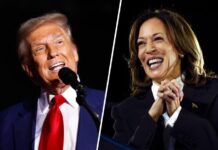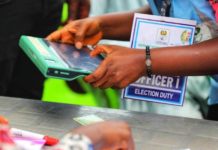More facts have emerged from the meetings held so far by the state governors elected on the platform of the All Progressives Congress, (APC), on the consensus candidate to fly the party’s flag in the 2023 presidential election.
President Muhammadu Buhari at a meeting with the governors urged them to allow him pick a consensus candidate as a “successor.”
Raye24repprters gathered that the governors have held two meetings so far, with another meeting expected to hold on or before Saturday.
During the first meeting, the governors were said to have deliberated on the idea of having a consensus candidate proposed by Buhari.
“Many of them agreed that it is an idea that can be tried,” a source privy to the meeting told our correspondent.
He, however, said during the second meeting, suggestions were given on who should be put forward as the APC consensus candidate.
Raye24reporters learnt that regional division marred the second meeting as some northern governors who spoke believed that a northern governor should be nominated as a consensus candidate.
Though the source did not specifically mention the name of the northern governor, Raye24repprters had reported that Kogi State Governor, Yahaya Bello; and Jigawa State Governor, Mohammed Badaru, are in the presidential race.
After a South-West governor, Rotimi Akeredolu, raised an objection to the idea, it was learnt that two of the northern governors also said a governor from the South could be considered.
Governors from the South who are contesting the presidency in 2023 are the Cross River State Governor, Prof Ben Ayade; his Ekiti State counterpart, Dr Kayode Fayemi and Ebonyi State Governor, Dave Umahi.
Asked about the Vice-President, Yemi Osinbajo and former Lagos State Governor, Bola Tinubu, the source said, “Most of the argument was centred on a governor succeeding Buhari, for now. But southern governors are talking about power rotation.”
He continued, “When Akeredolu and other southern governors asked them to consider the unity of Nigeria, the northern governors proposed that two governors from the South and North should be considered.”
However, some governors at the meeting argued that a southern candidate may not defeat the candidate of the Peoples Democratic Party, Atiku Abubakar, in the 2023 presidential election.
Atiku, who hails from Adamawa State in the northern part of Nigeria, had unsuccessfully contested five times for the Office of President of Nigeria in 1993, 2007, 2011, 2015 and 2019.
Efforts to reach the Chairman of the Progressive Governors’ Forum, Atiku Bagudu, proved abortive as of the time of filing this report. Calls made to his mobile number were not picked after they rang out.
When contacted, Governor Akeredolu’s spokesperson, Olabode Olatunde, said, “I was not part of the meeting. It was held among the governors behind closed doors, so I cannot give any details about it.”
Also, efforts to reach the media aides of Tinubu and Osinbajo proved abortive as they refused to pick up their calls or respond to text messages.
In May, Akeredolu warned the APC against zoning the 2023 presidential slot to the northern part of the country, saying that would lead to a crisis.
In a statement titled, ‘Our party, APC, must tread the path of equity,’ Akeredolu insisted that it was the turn of the southern part of the country to produce the next president.
Akeredolu said the agreement reached when the APC micro-zoned party’s offices during its National Convention must be adhered to.
Part of the statement read, “The current democratic dispensation is anchored on the unwritten convention driven by a principle of Equity. Our party just elected officers on the established principle of giving every part of the country an important stake in the political calculus. The focus has now shifted to the process which will culminate in the participation of our party in the general elections scheduled for next year.
“All lovers of peace and freedom must do everything to eschew tendencies which may predispose them to taking decisions which promote distrust and lead to a crisis, the end of which nobody may be able to predict.”









































